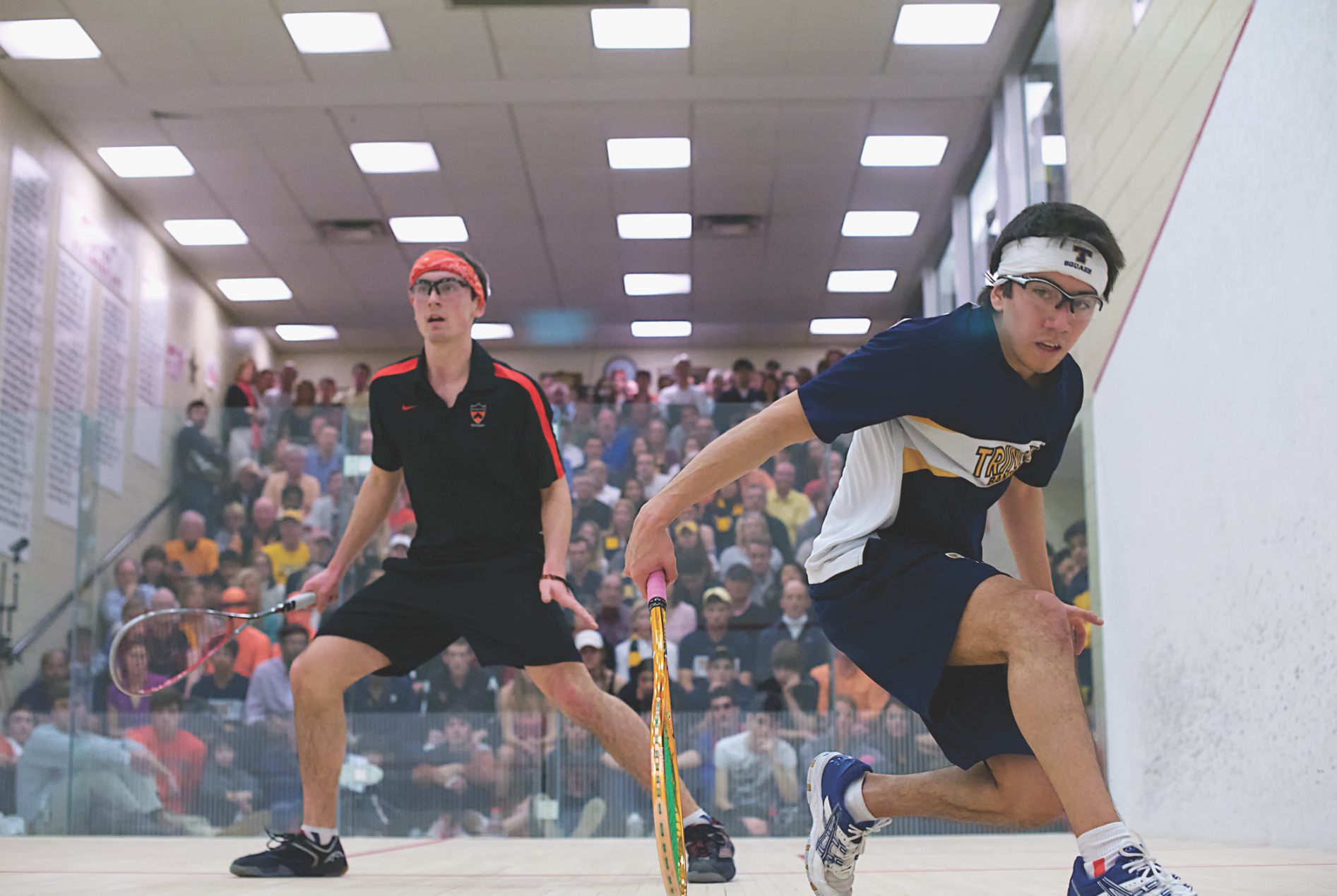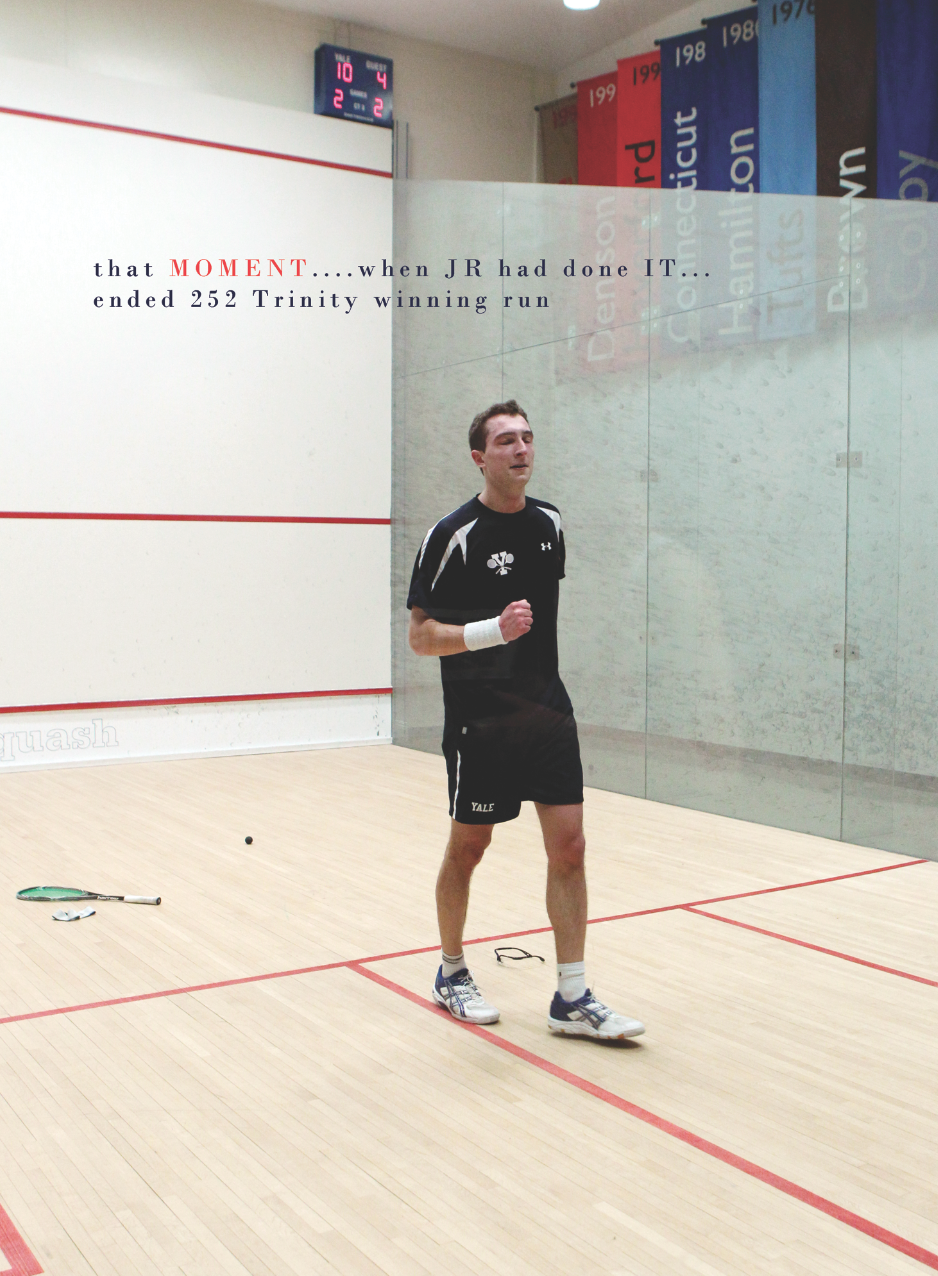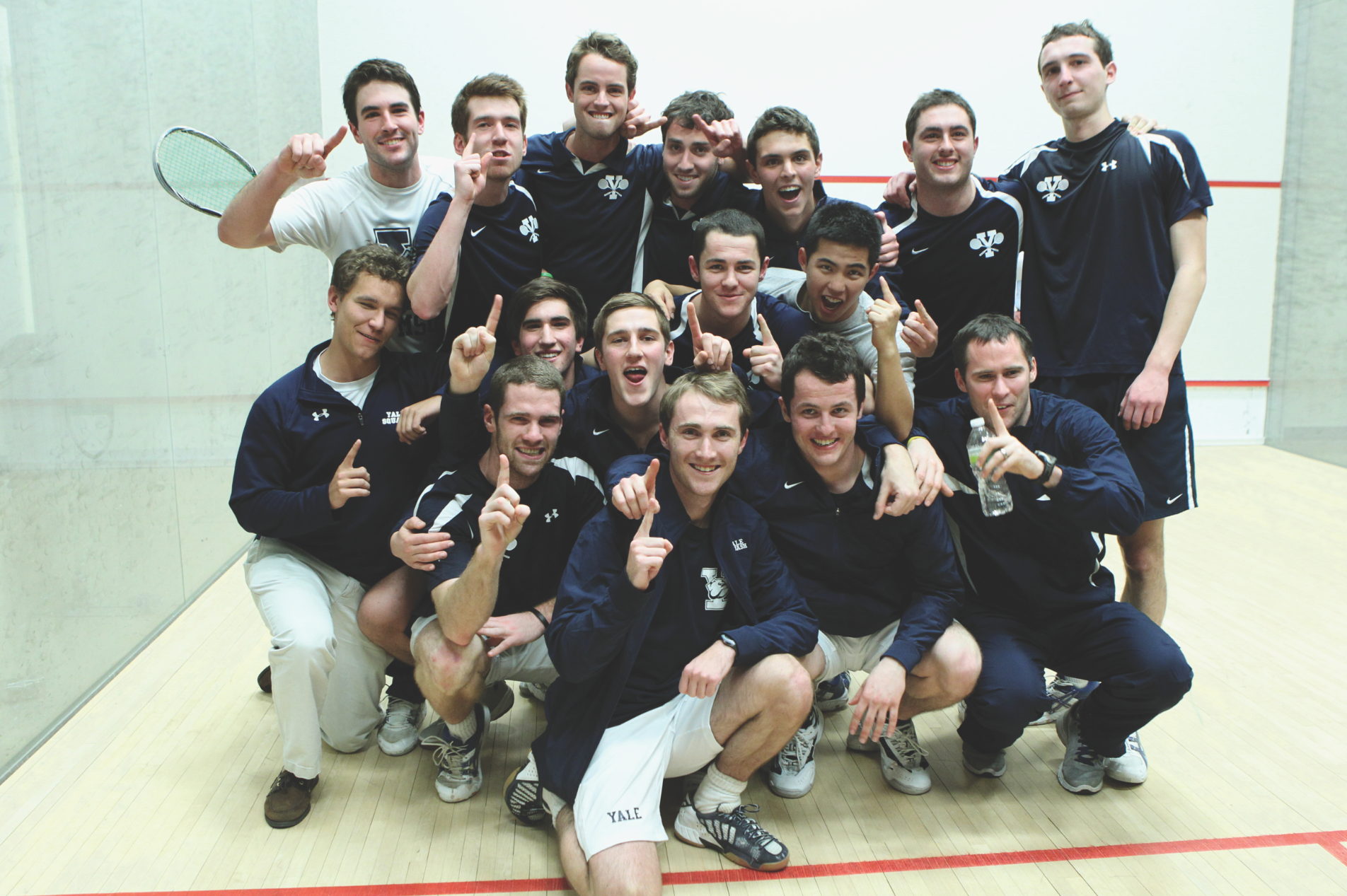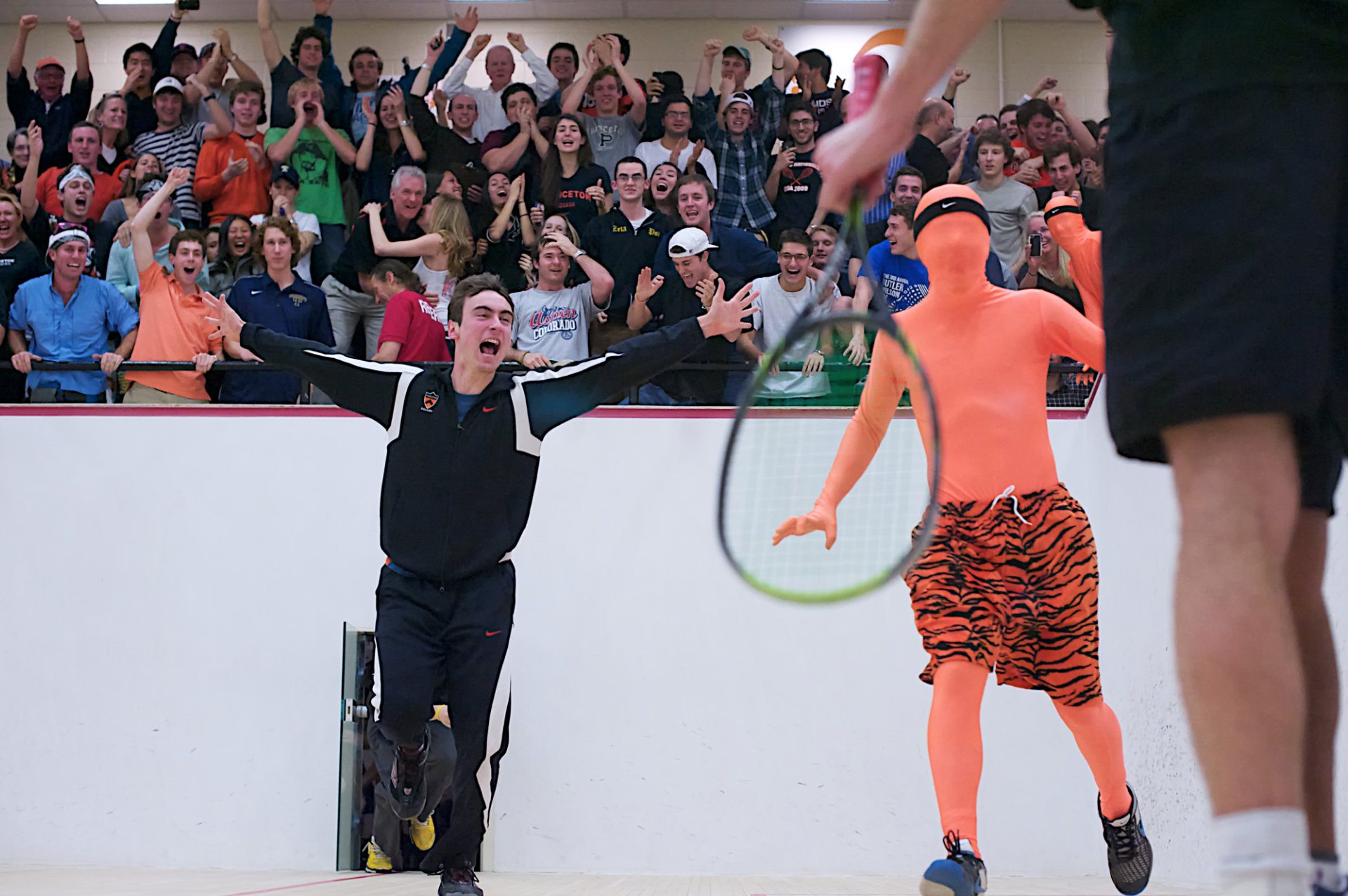
By James Zug
It was bound to happen. At some point, the numbers would stop ticking over. Eight times they had won 5-4 matches. A couple of them were ridiculously close, match balls saved, epic comebacks. It couldn’t go on forever like that.
The numbers stopped twice this season. The monkeys thrown off the backs would fill a rain forest. It was the most exciting and competitive season of men’s intercollegiate squash in the 90 that have been played.
Two hundred and fifty-two. That was the first number to die on the vine. In January Trinity lost to Yale and their unprecedented consecutive win streak, dating back to their last defeat in February 1998, ended at 252. The loss was not that much of a surprise. Yale almost toppled Trinity last year in the finals of the nationals, pushing them to a 4-3 scoreline before losing their last two matches.
One of the heroes that day last year was Johan Detter, who restored the score to 4-4 in a clutch performance. This year Detter was again in the hot seat. Trinity was up 4-3. In the two remaining matches, Robbie Berner of Yale lost the first game to Trinity’s Juan Flores, but then came back to take the next three. At that moment Detter had just lost the third game to Yale’s John Roberts and was down 1-2. Could he summon the magic that his older brother Gustav had used to stave off both a match ball down 0-2 in his Atlas Lives match against Princeton’s Yasser El Halaby in 2006 and a 0-2, 1-4 in the third scoreline three years later against Princeton’s Kimlee Wong?

Detter flew out to a 8-1 lead in the fourth and won it 11-5. But in the fifth, the story went wrong. Trinity is famously tough in fifth games. A friend of mine, David Keating, added up the number of times that a Trinity player went out for a fifth game this year: Trinity won eleven out of fourteen times.
Two of the three losses came against Yale and one was Roberts v. Detter. Roberts hammered it out 11-4. Yale won and set off a wild celebration in New Haven. “We were not as strong a team as last year but neither was Trinity,” Yale coach Dave Talbott said, adding that a key addition this year was the presence of his new assistant coach, John Rooney.
The path diverged for the two teams after that night. Yale barely beat Rochester (away) and Harvard (at home), 5-4 and then lost 8-1 to Princeton. Injuries took their toll. Hul Robinson at No. 2 and Charlie Wyatt at No. 9 went out to turf toe and back injuries respectively. At the nationals, Yale lost 8-1 to Cornell (who they had beaten 5-4 at home just before the Trinity match), barely beat Dartmouth and then lost 5-4 to Rochester. Yale finished sixth. “From first to sixth in a month, from ending the streak to this,” Talbott lamented. In his 29 seasons at Yale, no Talbott team has ever finished that low.

Five thousand and seventy-eight days had passed since the last time Paul Assaiante had to deal with a loss, so the aftermath of the defeat at Yale was unfamiliar for the Trinity coach. He received more than 2,000 emails in the first thirty hours after the loss and did interviews for more than two dozen media outlets including the New York Times, ESPN, Wall Street Journal and Bloomberg.com. “I always said I’d want the streak to end because of the growth that would be possible,” Assaiante said. “But it hurts. It hurts more than I expected. Still, character is revealed by adversity, Now that the burden of the streak has been lifted, we are very disappointed but at the same time now we can really start learning about ourselves. It occurs to me that it is great to be dominant suggests a talent advantage. But now I know it is better to be resilient because it suggests heart and character.”
After the loss to Yale, Trinity recovered. They beat Harvard, Rochester and Princeton 7-2, all at home. At the nationals, they hammered F&M and then battled very hard against Harvard in the semis. The match ended at ten minutes after nine that evening, less than fifteen hours before the start of the finals against Princeton. And it had been an endless, bruising tussle, with five of the matches going the distance and three others decided by two points in the fourth game.
The finals, Princeton v. Trinity, in Jadwin Gymnasium, was almost three years to the day after Trinity filched a victory there against Princeton in what was perhaps the greatest collegiate match of all-time. The place was jam-packed. People filled the showcourt gallery fifty minutes before the noon start. Monitors kept track of the spectators and capped it off at a thousand, preventing many fans, including some Trinity undergraduates, from even getting inside Jadwin. A half dozen Spider-Man mascots in optic orange schreeped about. Students filled the adjacent courts and watched the scoreboards and the reactions of fans in the gallery. Video feeds went into the Zanfrini fencing room and up on the track on Jadwin’s main floor; in addition, three hundred and twenty-five people paid $10 to watch it online, the most to ever pay to watch a Princeton sporting event. “This was better than Army v. Navy,” said Assaiante who coached at West Point for a dozen years.
The calculation was that Princeton had to get two wins in the first cycle of three matches and they did. Tyler Osborne overtook Miled Zarazua. It was their first nationals and Osborne, who had lost to Zarazua three weeks earlier, surprised everyone to take it in three games. Osborne had only beaten Zarazua once in nine tries, so it was this win that gave Princeton some hope. In the other Princeton win, Clay Blackiston fended off Vishrab Kotian. Blackiston was down 1-2. In the third he had an 8-2 lead, then 9-3. Kotian, a January recruit in his second month at Trinity, fought back. Blackiston was hanging on at 10-7, then 10-9. He won the game 11-9. In the fifth, Kotian was up 2-1 and then Blackiston reeled off ten straight points to clinch the match.
Trinity, as expected, won all three matches in the next cycle, to go up 4-2. No. 7 Dylan Ward put out Juan Flores according to plan. Then Todd Harrity took out Vikram Malhotra in three at No. 1 (Malhotra had won 11-9 in the fifth three weeks earlier).
4-4
One of the three Tigers who played three years ago in the heartbreaking loss to Trinity was Kelly Shannon, so it was appropriate that he was in the final match. Shannon wore down Reinhold Hergeth in the first game, 13-11. Hergeth had been diagnosed with mononucleosis earlier in the season and was worse for wear after his semis match. He had nothing left to fight off a rampant Shannon. Their match three weeks ago had gone to Hergeth 13- 11 in the fifth after more than an hour of play. Here it ended in three in half the time, with Shannon on fire, cracking a drop that Hergeth couldn’t reach.
“Relief—that is what I mostly felt first,” said Princeton coach Bob Callahan. “I could finally exhale after all these close losses to Trinity. Then some elation.” Callahan won two previous national team titles in the same fashion: in 1982 (with a 5-4 win at Harvard) and in 1993 (with a 5-4 win against Harvard at Princeton). Both were surprising upsets as well. “This season showed the home-court advantage like no other,” he added, pointing to a crucial factor that might have given Princeton a slight edge in the finals.

Assaiante had always said that he hoped that the standard of intercollegiate play would rise up to Trinity, rather than Trinity falling back. That has happened. For the first time in history, six schools had a legitimate shot at the national championship and the rankings yo-yoed more than ever before—no one stayed in the same place. A decade ago, Trinity would barely have to start their engines in the first two rounds of the nationals, thus having a full tank of gas in the van for the finals. This year, their semis match versus Harvard wore them out enough to have an impact on the finals.
Moreover, Americans played in these matches. As opposed to earlier seasons, when it was almost all overseas men, this year Americans played. Princeton had five in their top nine (Episcopal Academy, Penn Charter, Brunswick, Chestnut Hill and Penn Charter and their No. 10 was from Haverford); Yale had three (Belmont Hill, Brunswick and Groton); and even Trinity had one (Brunswick). Trinity’s, Matt Mackin, in fact, went undefeated this year at No. 8 and now boasts a 25-1 career record.
Does this suggest the end of the overseas recruit? Not necessarily. “It is a big statement about American squash, but we have an exceptional group of Americans here at Princeton,” Callahan said, pointing to intercollegiate champion Todd Harrity. “And however much the level of play has improved, overseas kids will still play a central role in intercollegiate squash.”
Trinity will be back for sure. But for now, Princeton owns the new numbers in intercollegiate men’s squash streaks: seven and one—seven straight wins and one straight national title.


